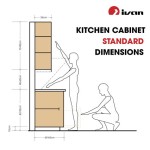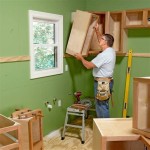Is There A Standard Size For Kitchen Cabinets?
When designing or remodeling a kitchen, determining the appropriate size for kitchen cabinets is crucial. While there is no universally recognized standard size, industry norms and practical considerations guide the dimensions of these essential storage units.
## Cabinet HeightThe height of kitchen cabinets typically ranges from 30 to 42 inches. Wall cabinets, also known as upper cabinets, are usually mounted 18 inches above the countertop to allow for comfortable reach and headroom. Base cabinets, which sit on the floor, measure between 34 and 36 inches in height, providing ample storage space for pots, pans, and other kitchenware.
## Cabinet WidthThe width of kitchen cabinets varies depending on their purpose and location. Common widths for wall cabinets include 12, 15, 18, 24, and 30 inches, while base cabinets come in widths of 12, 15, 18, 24, 30, 36, and 42 inches. Corner cabinets, designed to maximize space utilization in corners, typically have widths ranging from 15 to 36 inches.
## Cabinet DepthThe standard depth for kitchen cabinets is 24 inches, allowing sufficient storage capacity while minimizing the protrusion into the kitchen space. This depth ensures easy access to items stored in the cabinets without causing any obstruction or hindrance to movement within the kitchen.
## Exceptions To The NormWhile these dimensions serve as general guidelines, it's important to note that variations exist. Taller homeowners may opt for higher wall cabinets, and shorter individuals may prefer lower base cabinets for enhanced accessibility. Additionally, some specialized cabinets, such as appliance garages or spice racks, may have unique dimensions to accommodate their specific functions.
## Factors To ConsiderWhen selecting the right size for your kitchen cabinets, consider the following factors:
-Kitchen Layout:
The placement of appliances, windows, and doors will influence the available space for cabinets. -Storage Needs:
Determine the amount and type of storage required to accommodate your kitchenware, cookware, and other items. -Personal Preferences:
Consider your height, reach, and comfort level to ensure cabinets are easily accessible and functional. -Aesthetic Considerations:
The overall design and style of the kitchen can influence the choice of cabinet sizes and proportions. ## ConclusionWhile there is no definitive standard size for kitchen cabinets, industry norms and practical considerations provide valuable guidance. By carefully selecting the appropriate dimensions, you can create a functional and aesthetically pleasing kitchen that meets your specific needs.

Base Cabinet Size Chart Builders Surplus

Measure Your Kitchen Cabinets Before Designing The Layout

Kitchen Cabinet Sizes What Are Standard Dimensions Of Cabinets

Wall Cabinet Size Chart Builders Surplus
Guide To Kitchen Cabinet Sizes And Dimensions

N Standard Kitchen Dimensions Renomart

Abcs Of Kitchen Cabinets And Specifications Granite Quartz Countertops Factory

Kitchen Cabinet Dimensions Size Guide

Kitchen Unit Sizes Cabinets Measurements Height Cabinet

Guide To Master Kitchen Cabinet Dimensions With Ease Waterbuckpump
Related Posts








